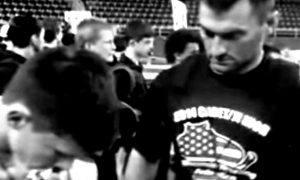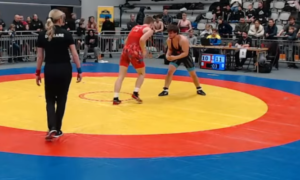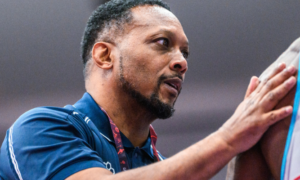The problem with social media is that it spreads opinions and ideals. Okay, that isn’t its only problem, but it’s a major one. Athletes are constantly subjected to competitive criticism and in a digital environment, these comments are ramped up to a very high level. You just can’t escape it. It is easy to see this whenever USA Wrestling or United World Wrestling posts a clip of a match on social. Fans and even other wrestlers hop on, put forth their two cents and many times, it’s ugly. Athletes in all sports are judged, but none more so than those who compete in one-on-one situations, such as wrestlers and MMA fighters. The spotlight is more defined. There are not multiple players in which to spread the attention around.
Maybe you have seen it first-hand. You might be a wrestler or fighter yourself. Have you ever lost a match and then had to deal with idiots on Facebook talking about it? Probably. Even if they throw in the odd “good job!” or “get ’em next time”, you just know that they are likely let down. They may even have some stuff to say elsewhere, maybe you caught someone on another person’s feed remarking how you all of the sudden choked. This is not an unusual occurrence. In fact, it is so common, it has become regular practice for well-known wrestlers and fighters to post apologies on their social media accounts in order to stem the tide of judgement from the masses. This my friend, is bullshit.
There was a meme in particular that caught my eye recently. Boy, is this thing fraught with issues.

Competitive Criticism Is an Ego Trip
The above image is easy to like. The whole “nobody understands what I go through to prepare to do this” thing is always popular with fighters and wrestlers. As an athlete, it is NOT easy to devote your life to a sport, compete at its highest level, and then see it all come crashing down. No, that is not a pleasure cruise. It is a sucky feeling preparing for a big competition only to get wiped out. Is it part of the program? Sure. Disappointment is as common as success. But that doesn’t make it any easier to swallow.
HOWEVER – look at what the world has done to athletes. Because information is spread so quickly and because we are all hyper-connected to each other on the internet, there is this misguided feeling of accountability. So you lost a match in front of your friends and family? Be sure you fire out a post on Facebook basically asking for forgiveness! Insanity.
The above meme is just one teeny tiny example in a sea of millions, but it’s a decent one. The defensive nature in which it is written is downright hilarious, so let’s examine the wording.
“Behind every athlete is a lost youth to fulfill a dream” – This line is just tremendous. It’s telling the reader right away, “hey, it has taken me years to lose in front of you, so gimme a break.”
“But people don’t see that, so when you see a fighter applaud” – I’m just picking on this one because there is no comma after fighter, making it sound like it is really cool to watch a fighter sit in a chair clapping.
“Because to be prepared for slaughter takes much more ‘then’ (sic) a last minute decision” – So wait, you trained and trained just to get mauled?
“To be great it takes YEARS” – Okay, so this isn’t all bad. It’s true, at least for most athletes. Being great does take years. But you just done told me to understand all it requires for you to go in there and lose, right? Or am I missing something?
This sensitivity, this defensive posture, is a problem. I don’t blame whoever wrote that thing up; they are undoubtedly a product of the social media culture the modern athlete is forced to exist in. Which is the underlying issue here. There are just too many people athletes feel accountable to. To say this is a harmful attitude to withhold would be an understatement. If you are willing to compete in front of people, you have to also be willing to embrace competitive criticism. You don’t get to play the whole tough guy (or girl) role and then complain when the lights are too bright.
Fans Don’t Deserve an Explanation, But They Also Have the Right to Say You Suck
Following every UFC card, I read MMAFighting because they do this whole thing where they display all of the Facebook and Twitter posts from the event’s athletes. I eat this shit up. The winners post the usual fluff: maybe they give credit to their opponents, thank their sponsors, hold up a “peace sign”, what have you. But it is the ones who lost I zero in on. It is often a treasure trove of remorse, as if they wronged someone. It bears understanding that in many cases, this UFC shot for them represents a career milestone they don’t want to see slip away. I’m not without compassion. It is when you apologize to the fans I get all unsettled. Answering uneducated competitive criticism with social media defense mechanisms very rarely rings true.
The people who watch you – family members, teammates, friends, training partners, coaches – do NOT deserve your apology or an explanation. Nope. Never. Never ever. So they paid to see you at the Olympic Trials or on a fight card or wherever. And you lost. You lost big. Really big. Athletes feel bad about this, I’ve seen it once if I’ve seen it a thousand times. “Sorry you came all this way just to see me lose.” It’s horseshit. So we’ll go ahead and get that out of the way. If someone who battled and lost feels badly a friend or loved one shelled out money and time only to witness them lose, and they feel compelled to address that, okay. It won’t matter, but it happens and I get that.
But fans? They deserve even less. “Oh, but without them we wouldn’t have the support.” So? People you don’t know and never really will are just that – people. They aren’t merely paying customers, they aren’t just an audience. They get to share in the experience for themselves. Your responsibility to them was met the moment you stepped on the mat and unleashed holy hell for six minutes. That is the terms of the agreement. What happens after is inconsequential. Unless you win, of course.
It’s Not Their Problem, It’s Yours
By extension, the same people who you do not owe an explanation to have the absolute right to conduct competitive criticism every which way. It is not a fan or friend’s job to realize all of your hard work. It is not their responsibility to know all of the ole’ blood, sweat, and tears you endured. It would be nice if they did. What a wonderful world it would be if the spectating public caught just a glimpse of the sacrifice it takes to win a spot on the national team or to capture a gold medal at the Olympics. These are stories needing to be told. The hitch in all of this is simple, I’m afraid: a meme doesn’t tell that story. Neither does an apology, or an explanation, or a Facebook post decrying how you’ll “do better next time.”
A person does not become a national champion or successful MMA competitor by going through life apologizing for each setback. It’s just not how it works. It can’t be how it works. There isn’t enough time or available energy to expend. Wrestling requires an ultimate devotion to the sport in order for someone to be successful. That is true for JV wrestlers as well as Olympians. There is just not enough space to worry about failing and even less when there is a failure, to go on the internet and apologize to everyone about it. Quite the contrary, the sport DEMANDS you get the f— back up and in the wrestling room. That’s the beauty of the whole thing.
You Can Handle It Anyway
What people say, all of the competitive criticism that makes its way to the surface, is like a passing storm. It might seem intense at first, but soon enough it is gone as quickly as it arrived. Even if the chatter from the cheap seats has some staying power, it isn’t anything a truly dedicated athlete can’t handle. Competitive criticism is the new law of the day given how fast we share information. So be it. This doesn’t change what your goals are, what it takes to achieve them, and how to go about it. Let them talk. You have bigger things to focus on.












